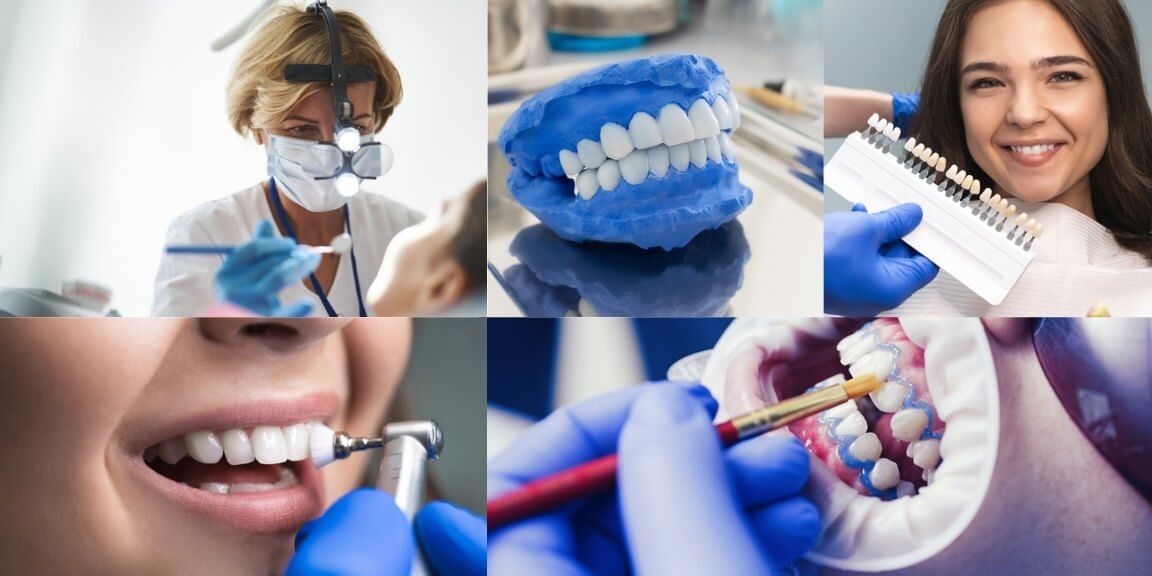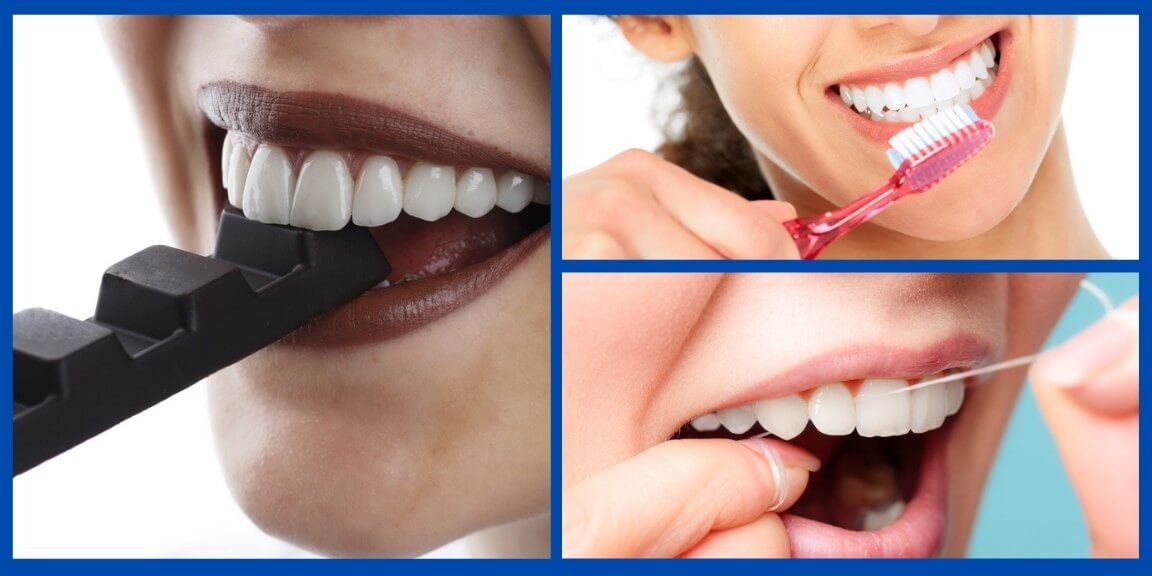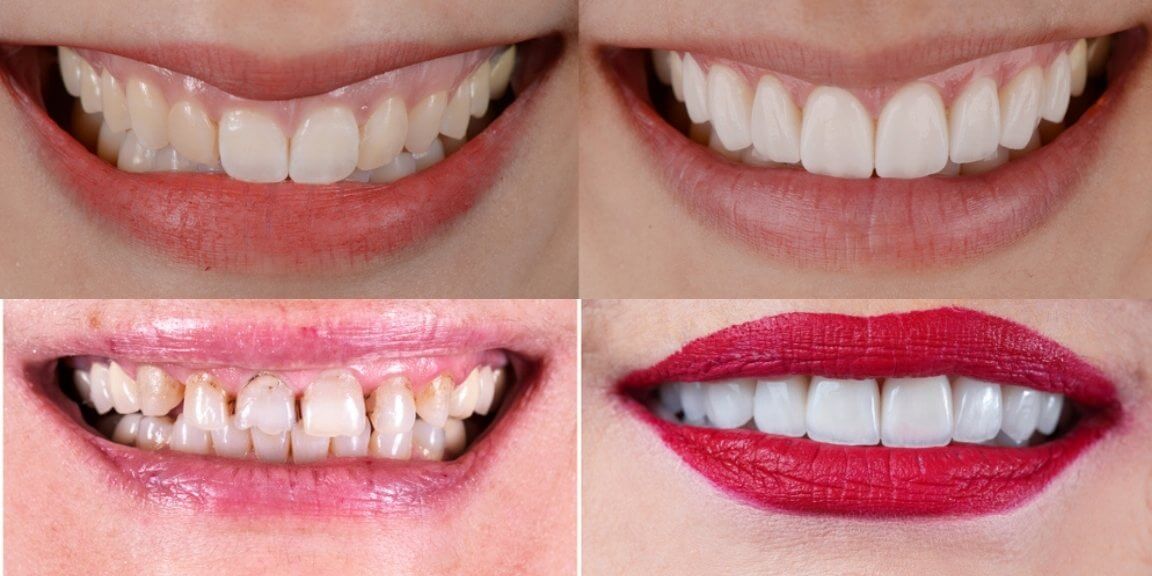Getting cosmetic dentistry can be a process, but one that is rewarding. Veneers are one of the most common types of cosmetic dentistry. If your teeth don’t meet your standards of beauty or functionality, then veneers could be the right choice for you! As you learn more about veneers, you’ll discover there are two types: porcelain veneers vs temporarily snap-on veneers. Knowing the difference between these two types can help you decide which is right for you.
In this blog, we’ll cover the differences between the temporarily snap-on veneers vs more durable porcelain veneers, and give information that can help you decide which type of dental appliance is best for your teeth. The more information you have, the easier it is for you to choose the right option for your budget and your needs.
What Are Porcelain Veneers?
These veneers are like tooth-shaped covers, made of porcelain, that fit over the front of your teeth. Porcelain veneers can hide defects like cracks, stains, chips and misshapen teeth, making your smile look perfect, straight and white. Porcelain veneers are not intended to be removed. Once a porcelain veneer is on your teeth, it cannot be taken off.
What Are Removable Veneers?
Removable veneers are a type of snap-on, snap-off dental appliance, similar to a mouth guard. Removable veneers are customized for your mouth because they are based on a mold of your teeth. This helps ensure that your dental veneers will fit your teeth perfectly, slide on easily, and stay on until you choose to take them off.
Porcelain Veneers Vs. Removable (Snap-On) Veneers
Both removable veneers and porcelain veneers cover up your natural teeth, to create a uniform and attractive appearance. Both types of veneers look like natural teeth, with a beautiful pearly white appearance and straight alignment, free from cracks, stains, chips and more.
Although porcelain and snap-on veneers look similar, they’re installed in very different ways.
Porcelain dental veneers are permanently affixed to your teeth. In order to make room for porcelain veneers, your dentist must grind down the outer layer of enamel on your teeth, then the veneers are permanently affixed to your teeth. Porcelain veneers are only removed for replacement, usually after they have become chipped, cracked or stained. Because your teeth are shaped for fitting, you will always wear porcelain veneers after you’ve had them installed.
Removable dental veneers are not a permanent part of your mouth. Similar to a mouth guard or dentures, removable dental veneers can be taken off and put back on whenever you want. You can take off your veneers to brush your teeth, then put the veneers back on. The cost of snap-on veneers is much less compared to the cost of porcelain veneers.
Best Candidate for Porcelain Veneers
If you’re someone who would like to have a beautiful smile, then you may be a good candidate for veneers. It’s important to have good oral hygiene and good overall dental health. Plan to maintain good oral hygiene to maintain your porcelain veneers. Brushing your teeth is more important than ever once veneers are installed, to ensure the longevity and durability of the veneers.
How long do porcelain veneers last?
These types of veneers typically last for a longer time compared to the snap-on! You can expect porcelain veneers to last for at least 10 years, and up to as long as 20, if you take care of them. This is convenient compared to removable veneers, which only last for one to two years.
How do you maintain and clean your porcelain veneers?
Clean your porcelain veneers in the same way that you clean your teeth, by brushing twice per day and flossing. Switch to a non-abrasive toothpaste when you get porcelain veneers, to avoid scratching the porcelain.
Clean snap-on veneers on a regular basis, following this procedure:
- Take off your veneers every night.
- Brush your veneers with gentle soap and a soft brush.
- Set aside your veneers to air dry. Do not use a blow-dryer.
- Never soak your veneers in mouthwash or use a hard brush to clean your veneers.
How do you eat and sleep with veneers?
Traditional type veneers such as porcelain veneers do not affect your sleeping habits. Avoid chewing hard things like ice and hard candy when wearing porcelain veneers.
While it’s possible to eat with snap-on veneers, avoid some foods. Do not eat crunchy or hard foods with your snap-on veneers. Avoid hot foods as well. If possible, it’s always best to remove your snap-on veneers before eating anything. Avoid eating sticky, gummy foods like candies.
Remove snap-on veneers before sleeping to prolong their service life and keep them in good condition. If you do choose to sleep with your veneers on, remove them to brush your teeth before bed. You can put them back on when your teeth are clean.
Porcelain Veneers Treatment Journey
Porcelain Veneers:
- Your will be examined for your teeth to ensure you’re a good candidate for Porcelain veneers.
- The dentist will shave off a small amount of tooth enamel to prepare your tooth or teeth for veneers.
- A mold of your teeth will be made and you will choose the right color for your veneers. The order will be sent to a lab.
- These temporary veneer will be given to you to wear until the permanent veneers arrive.
- The veneers will placed on top of your teeth.
Snap-on Veneers:
- Your dentist will make an impression of your teeth.
- Impression of your teeth will be sent to a laboratory.
- Usually labs will create a set of porcelain veneers based on the impression of your teeth, then mail the veneers back to your dentist.
- The dentist will ask you to come in for a final fitting.

Cost of Porcelain Veneers Vs. Removable (Snap-On) Veneers
Porcelain veneers can cost as much as $2,500 per tooth, while snap-on veneers can cost approximately $500 to $1,000 per arch because they are not permanent and are not recommended by most dentists. Most removable veneers last for only one or two years, they could cost more money over time.
Financing Options
Membership or discount plans are available for $299 annually, to reduce your portion of the cost for receiving veneers. To ensure that you’ll get the most for your money and that your veneers will be a good investment, it’s important to have very good oral hygiene, without cavities and other oral hygiene problems. There are many third party institutional financing options available as well to help you to pay for your Veneer’s cost, make sure that you ask about these options from your treatment coordinator on your next visit.
Does insurance help?
Some insurances may pay for porcelain or snap-on veneers. Therefore, to find out whether your insurance will cover the cost of either type of veneers, call your dental insurance company or read your policy.
Pros & Cons of Porcelain Dental Veneers
There are many important pros and cons here is a short list below, but to learn more about the pros and cons of dental veneers you should visit our other article that explains more in detail.
Pros of Porcelain Veneers
- Permanent. Porcelain veneers are made to last, so you don’t have to get new veneers every few years.
- Attractive. Your porcelain veneers will give your teeth a lovely, healthy, uniform appearance without the expense and hassle of more invasive dental procedures.
- Natural Looking white, translucent teeth
- Stain Resistant
- Durable and long lasting
- Instant Results
- Whiten your teeth quickly and easily
- Replaced Damaged Tooth Enamel
Cons of Porcelain Veneers
- These veneers cost more than snap-on veneers – at first. However, snap-on veneers need to be replaced frequently, which can drive up the cost over time.
- Sensitive
- Irreversible process
- Can Be Damaged
- Shorter life span

Dental Veneers FAQ
What material creates porcelain veneers?
Porcelain veneers are made from porcelain or composite material. Snap-on veneers are made from resin.
Which is better for me: porcelain veneers or snap-on veneers?
This depends on your budget, the condition of your teeth and also your personal preferences. Your dental professional can go over the options with you and help you decide which one is best for you.
How long do porcelain veneers last? How long do snap-on veneers last?
Typical porcelain veneers last for decades, while snap-on veneers last approximately two years, although some can last up to five.
Are Porcelain Veneers look more natural?
Veneers are designed to look like your natural teeth, minus imperfections like stains, gaps and more. They’re colored and shaped like natural teeth, so no one will be able to tell you’re wearing them.
Do porcelain veneers need a lot of maintenance? Do snap-on veneers?
Porcelain veneers: Brush porcelain veneers twice daily with non-abrasive toothpaste.
Snap-on veneers: Wash your snap-on veneers once per day, and of course maintain your standard oral hygiene routine to continue to take care of your teeth.
How long does it take my veneers to be made?
Depending on several factors, but a typical turnaround time is two or three weeks. Your dentist will let you know when your veneers are ready and in the office.
What is the cost for porcelain veneers? How much do snap-on veneers cost?
Porcelain veneers cost between $900 and $2,500 per tooth. The cost for snap-on veneers depends on many factors. For example, some snap-on veneers cost as little as $500 or $1,000 per arch, although the price can vary depending on your personal circumstances. Get a quote from your dental professional.
Want to know more about porcelain veneers? Get started with your first consultation today.
In conclusion, it’s important to work with a cosmetic dentist in Houston to find out more about getting porcelain veneers in your area. When you contact a capable cosmetic dentist in Houston, you’ll be brought in for a visit consultation. A treatment coordinator will create a treatment plan, so you’ll know your treatment cost and other details. Your treatment coordinator can also help you find the best financing options and after-care. For more information, book your next Veneer appointment today.


